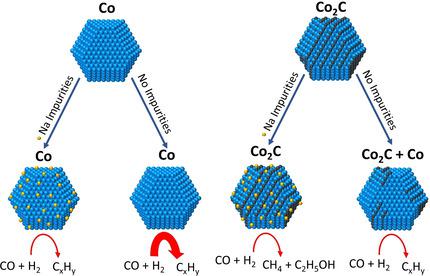当前位置:
X-MOL 学术
›
ChemCatChem
›
论文详情
Our official English website, www.x-mol.net, welcomes your
feedback! (Note: you will need to create a separate account there.)
Impurity Control in Catalyst Design: The Role of Sodium in Promoting and Stabilizing Co and Co2C for Syngas Conversion
ChemCatChem ( IF 3.8 ) Pub Date : 2020-11-29 , DOI: 10.1002/cctc.202001703 Arun S. Asundi 1 , Adam S. Hoffman 2 , Sindhu S. Nathan 1 , Alexey Boubnov 3 , Simon R. Bare 2 , Stacey F. Bent 1
ChemCatChem ( IF 3.8 ) Pub Date : 2020-11-29 , DOI: 10.1002/cctc.202001703 Arun S. Asundi 1 , Adam S. Hoffman 2 , Sindhu S. Nathan 1 , Alexey Boubnov 3 , Simon R. Bare 2 , Stacey F. Bent 1
Affiliation

|
The design of supported heterogeneous catalysts requires a detailed understanding of the structure and chemistry of the active surface. Although the chemical components of the active phase, support material, and process feed are typically considered to be the most important factors governing catalyst structure and performance, many common commercial supports contain trace impurities, which can have profound effects on catalyst properties. In this work, we study silica‐supported cobalt‐based catalysts, which are widely used in syngas conversion to value‐added products. Supported metallic Co is a commercial Fischer‐Tropsch catalyst, whereas Co2C has shown promise for the direct conversion of syngas to higher oxygenates. This study examines the effects of Na, a commonly detected support impurity and a frequently used promoter, on the structure and reactivity of Co and Co2C. We show that trace Na impurities significantly decrease catalyst activity of supported metallic Co, and that high Na concentrations result in Co2C formation and a loss in Fischer‐Tropsch activity. However, in Co2C catalysts, Na plays an important role in stabilizing the Co2C phase, but excess Na decreases catalyst activity. We use in situ X‐ray absorption spectroscopy to study Co2C formation and decomposition in the Na‐free catalyst under carburization and reaction conditions. The work reveals the importance of carefully controlling alkali metal content, particularly at trace levels, in catalyst design.
中文翻译:

催化剂设计中的杂质控制:钠在促进和稳定Co和Co2C合成气转化中的作用
负载型多相催化剂的设计需要对活性表面的结构和化学性质有详细的了解。尽管通常将活性相,载体材料和工艺进料的化学成分视为控制催化剂结构和性能的最重要因素,但许多常见的商业载体均含有痕量杂质,会对催化剂性能产生深远影响。在这项工作中,我们研究了二氧化硅负载的钴基催化剂,该催化剂被广泛用于将合成气转化为增值产品。负载金属Co是一种商业费-托催化剂,而Co 2C已经显示出将合成气直接转化为更高的含氧化合物的希望。这项研究检查了Na(一种常见的载体杂质和一种常用的促进剂)对Co和Co 2 C的结构和反应性的影响。我们表明,微量的Na杂质会显着降低负载的金属Co的催化剂活性,而高Na浓度会导致Co 2 C的形成并降低费-托活性。然而,在Co 2 C催化剂中,Na在稳定Co 2 C相中起重要作用,但是过量的Na降低了催化剂活性。我们使用原位X射线吸收光谱研究Co 2在渗碳和反应条件下,无钠催化剂中C的形成和分解。这项工作揭示了在催化剂设计中仔细控制碱金属含量的重要性,特别是在痕量水平上。
更新日期:2020-11-29
中文翻译:

催化剂设计中的杂质控制:钠在促进和稳定Co和Co2C合成气转化中的作用
负载型多相催化剂的设计需要对活性表面的结构和化学性质有详细的了解。尽管通常将活性相,载体材料和工艺进料的化学成分视为控制催化剂结构和性能的最重要因素,但许多常见的商业载体均含有痕量杂质,会对催化剂性能产生深远影响。在这项工作中,我们研究了二氧化硅负载的钴基催化剂,该催化剂被广泛用于将合成气转化为增值产品。负载金属Co是一种商业费-托催化剂,而Co 2C已经显示出将合成气直接转化为更高的含氧化合物的希望。这项研究检查了Na(一种常见的载体杂质和一种常用的促进剂)对Co和Co 2 C的结构和反应性的影响。我们表明,微量的Na杂质会显着降低负载的金属Co的催化剂活性,而高Na浓度会导致Co 2 C的形成并降低费-托活性。然而,在Co 2 C催化剂中,Na在稳定Co 2 C相中起重要作用,但是过量的Na降低了催化剂活性。我们使用原位X射线吸收光谱研究Co 2在渗碳和反应条件下,无钠催化剂中C的形成和分解。这项工作揭示了在催化剂设计中仔细控制碱金属含量的重要性,特别是在痕量水平上。











































 京公网安备 11010802027423号
京公网安备 11010802027423号